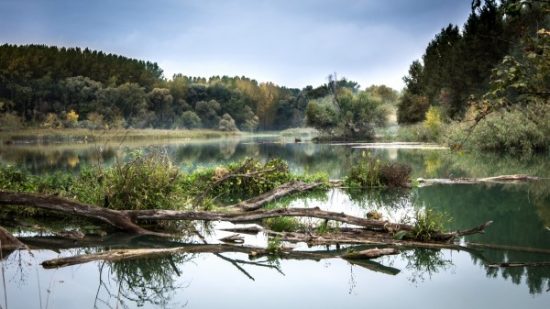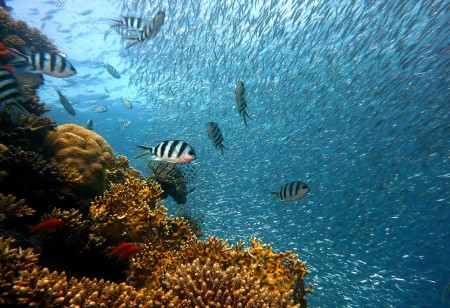The latest issue of Philosophical Transactions B is on ‘Climate change and ecosystems: threats, opportunities and solutions’.

The latest issue of Philosophical Transactions B is on ‘Climate change and ecosystems: threats, opportunities and solutions’. Guest Editors Professor Yadvinder Malhi and Professor Janet Franklin tell us about how this issue came about, and why it is so important to be having these conversions at this time.

The future of the world’s ecosystems and the future of the climate are intimately entangled. As we survey the news headlines over the last few months, we see that ecosystems are at the front line of climate change impacts, with, for example, Australia and California on fire in warmer and drier summers, or coral reefs bleaching in ever-warmer oceans. It seems the first major impacts of climate change are being manifest through ecosystem alteration. There is a fear of long-term degradation, of irreversible state shifts and tipping points, and of feedbacks that lead to further global heating.
At the same time, from the urgent street voices of the climate activists to the deliberations in the slick corridors of Davos, there is a call that ecosystems can play a role in mitigating climate change, in adapting to its effects, and in navigating away from dangerous tipping points. At the same time, these interventions can tackle and reverse another major environmental challenge of our times: the ongoing decline of biodiversity and biological abundance. There is a welcome emphasis on nature-based solutions (NbS) to climate change, or natural climate solutions. There is also a danger of overstating this case – restoring ecosystems and planting trees can only make a modest contribution to climate change mitigation and should not be used as an excuse to avoid or defer the fundamental challenge of decarbonisation. When the President of the USA denies the urgency of climate change at Davos yet talks up planting a trillion trees in the same breath, we have reason to be cautious or even alarmed. Ecosystem protection and restoration can, however, contribute to the rapid transition to net-zero carbon emissions that is needed while the more fundamental problems are addressed at scale.
In this context, the issue of Philosophical Transactions B published this week explores a range of topics around the theme of climate change and ecosystems. It explores both the impacts of climate change on the biosphere and the opportunities and challenges that the management and restoration of ecosystems provide for mitigating and adapting to climate change. It emerges from a binational (USA-UK) forum on climate change and ecosystems that took place in Washington DC in November 2018. This forum was jointly sponsored by the Royal Society, UK, and the National Academy of Sciences, USA. We and the organising committee had the privilege of selecting a few dozen of the best scientific minds in both countries working on these issues. The full report of the forum can be found here.

It is impossible to do justice to the span of the papers and issues discussed in this brief blog, and the introduction paper of the thematic issue gives a more detailed overview of the papers and the issues that emerge. Instead, we highlight a few key themes. Much of the focus on natural climate change has been on terrestrial ecosystems, especially forests, or coastal systems such as mangroves. A couple of papers in the issue highlight the potential contribution of marine ecosystems, which range from seafloor ecosystems to ecologically intact protected open ocean areas with abundant fauna. Much discussion on ecosystem-based climate mitigation has focused on trees and their carbon stocks alone. Several papers highlight the role of ecological intactness, where rich and complex ecosystems exhibit both greater resilience to climate extremes and greater opportunities for robust climate mitigation. Soil ecology is also often neglected but also plays a major role in ecosystem function, resilience and carbon storage. There is also a need for out-of-the-box thinking: for example, by exploring the potential and challenges of megafaunal reintroduction in the Arctic tundra as a way of limiting permafrost thaw.

There is already a diverse range of studies on nature-based solutions. Still, such solutions do need to be critically evaluated for their effectiveness and to identify their limits and challenges. There remains a need for better understanding of the benefits of NbS for fisheries, agriculture, and other ecosystem services to society, as well as to ecosystem integrity. For example, many statements on trees planting end up prioritising non-native tree plantations, which may store carbon in their biomass but harm native biodiversity and have limited climate resilience. Soto-Navarro et al. show globally that in some ecosystems biodiversity and carbon priorities converge (e.g. tropical and boreal forests), but in other biomes, a focus on carbon and climate mitigation may not deliver biodiversity benefits (for example by planting trees in natural grasslands).
A key challenge is one of scale. How do ecosystem management and restoration move from being a collection of boutique projects that have local impacts and assist local adaptation to climate change (which is undeniably essential) to something that can make a significant contribution to global climate mitigation? Several papers explore this challenge. Griscom et al. estimate the maximum potential of ecosystem-based climate mitigation in different countries. Lawler et al. demonstrate that by designing large scale conservation networks of protected areas with climate change in mind, the additional cost of planning for climate change may be relatively modest compared to the cost of expanding the reserve network without considering climate change. Lenton explores how positive social-technological tipping points can be facilitated to address climate change. Finally, Norton et al. explore how existing social assistance programmes to the poor may provide an opportunity to implement large-scale and diffused ecosystem restoration while also addressing development and inequity challenges.
At some point this century, hopefully sooner rather than later as humanity faces the decarbonization challenge, global atmospheric greenhouse gas concentrations are likely to stabilise, and global temperatures to peak. Judicious restoration of ecosystems will have played a significant role in that stabilisation and would continue to play a role in the subsequent cool-down. The climate change that will already have occurred will have led to ecosystem degradation and biodiversity loss. But in a world where nature-based solutions have been implemented at scale, ecosystems that are intact, extensive and connected have a much better chance of adapting and thriving in this new climate regime. They can also provide a vibrant and resilient biosphere that is needed for its own sake, and that provides the fabric within which human societies exist and thrive.
Browse other research in this area in our environmental science subject collection.




